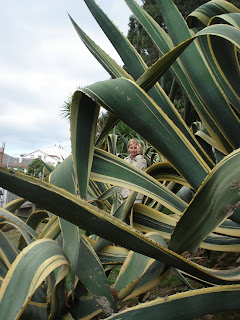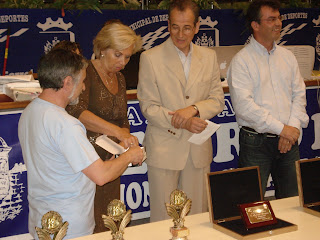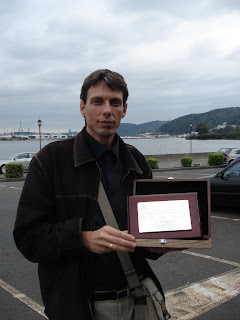It is again concerning the tournament in Ferrol, and starts like this:
At the Atlantic coast of north-west Spain, from 15-20 July the 23rd edition of open tournament “Ciudad de Ferrol” took place. Besides the regular ones, “accidental prizes” were given during the closing ceremony. The rest you can find here: http://www.chessvibes.com/tournaments/accidental-prizes-at-ciudad-de-ferrol/#more-2234
28.7.08
For the Third Time
Galicia is the west-north part of Spain. For the XXI time the “CIRCUITO GALEGO DE XADREZ” takes part here. Total of six tournaments constitute it- in Burgas, “V Maestro Rodrigo in memoriam” in Ferrol, “II Memorial Arximiro Penide Cedeira “MIRO” in Arteixo, Cambados (Pontevedra), Ortiguera (La Coruna) and “Virxe Peregrina” in Ponteverda. Galicia’s main cities host the tournaments, and in addition the biggest part of the events take place during the famous fiestas, players may never be bored.
For the overall placement in the circuit a player should take part in at least three tournaments and the points that he collected in them are counted. If he takes part in more events he may use his best results. In case that there is equality in points one looks for better placement in the separated competitions. There are additional prices for the circuit, and there are players who participate here from a very long time-one example is GM Vladimir Dimitrov from Bulgaria (fifteen times), as well as GM M. Manolache from Romania, IM Jordan Ivanov, etc. Even top player like Ivan Cheparinov formed themselves as fighters in Galicia.
The tournament that I would like to tell you now is second from the circuit-the one in Ferrol.
(Easy to guess where is he coming from-IM Kidambi Sundararajan (IND))
This nice little town was the birthplace of general Francisco Franco and Pablo Iglesias (fonder of the Spanish socialist party), and has been a major naval shipbuilding centre for most of its history, as well as the capital of the Spanish Navy's Maritime Department of the North since the time of the early Bourbons. Before that, in the 17th century, Ferrol was the most important arsenal in Europe. It is still an important harbour and is famous for it’s’ sea food, surf-beaches and glass-houses. On Saturday as one of the local fiestas “de Pulpo” (for Octopuses) was taking place 3000 portions of this delicious food were presented to the people in a village nearby.
It was my third tournament here, and usually the field is very strong. For the price fund of about 15 000 euros were competing 160 people from 20 countries. Among them were 12 GMs and 23 IMs, or 53 titled players in total. As usual the tournament started with some of the players forfeit. It is a long way, and with many tournaments held in Spain in the summer some of them simply can not come, and others prefer to choose another tournament.
 (My Wife in front of Enormous Aloe Vera)
(My Wife in front of Enormous Aloe Vera)
It was my third tournament here, and usually the field is very strong. For the price fund of about 15 000 euros were competing 160 people from 20 countries. Among them were 12 GMs and 23 IMs, or 53 titled players in total. As usual the tournament started with some of the players forfeit. It is a long way, and with many tournaments held in Spain in the summer some of them simply can not come, and others prefer to choose another tournament.
Two things are interesting about the competition-one is the possibility to take “bye” and earn half a point without play. One player has the right to take 2 byes during the tournament but they can not be in rounds 1, 8, or 9. Of course, they have to be announced before the start of the event. It is a good idea for those who can not play early morning rounds (although I do not consider 10 o’clock too early, but some do), or players who does not like double rounds. The tradition here is that there are at least two double rounds (on Saturday and Sunday-to let people work), and this year they were even three. Chess life is speeding up, but if I have to be honest this is for no good. At least for me.
Another interesting thing is the presence of ten “lucky” prices each of them at the cost of 100 euro. The organizer of the tournament Juan Rodriguez explains me the idea: “1000 euro is not a big amount of money, and at the same time these prices make the tournament interesting for ordinary chess lovers. At the closing ceremony we make a lottery for the non-awarded players and anyone can be winner if he is lucky, no matter which place he took in the event.” Funnily enough at least three players missed their luck for no presenting at the closing ceremony and lost their prices. Among the rewarded were two IMs-Tadej Sakalsek from Slovenia and Larino Nieto who was the unlucky 21-st in the tournament, but his destiny was to take a price!
 (Lucky Prices)
(Lucky Prices)
Another interesting thing is the presence of ten “lucky” prices each of them at the cost of 100 euro. The organizer of the tournament Juan Rodriguez explains me the idea: “1000 euro is not a big amount of money, and at the same time these prices make the tournament interesting for ordinary chess lovers. At the closing ceremony we make a lottery for the non-awarded players and anyone can be winner if he is lucky, no matter which place he took in the event.” Funnily enough at least three players missed their luck for no presenting at the closing ceremony and lost their prices. Among the rewarded were two IMs-Tadej Sakalsek from Slovenia and Larino Nieto who was the unlucky 21-st in the tournament, but his destiny was to take a price!
Three years ago the monument of General Franco was destroyed, and as we already joke a new one going to be build soon. For the player who won convincingly Ciudad de Ferrol for third time in a row-GM Julian Radulski from Bulgaria. This is a lucky place for him, he never lost a game for all three years, and always achieves at least “plus five” score. Last year he was ready to accept a draw in the final round (and claim the second price) but then someone congratulated his main rival with the overall win, Julian got angry, played, and won convincingly. He came here after two excellent tournaments (first place in Montcada, and second in Torredembara, in Cataluna) and despite the tiredness managed to achieve his ordinary plus five. Five more players shared the win with him, but since his start was better and his cumulative score overwhelming he collected yet another silver plaque.
Co-winner became one young and strong Cuban player-Isam Ortiz Suarez. A week ago he won the first tournament in the circuit- Ciudad de Burgas and earned a GM norm there. His result in Ferrol was also worth the norm, but he lacked the GMs.
There were four more players to tie for the first place-Nanko Dobrev from Bulgaria, Kidambi Sundararajan and Ponnuswamy Konguvel from India and Robin Swinkels from Netherlands.
One funny case happened in a game of Alexei Barsov. Uzbek’s Spanish opponent lost on time, but claimed that the clock is not working properly, and that he still had 9 seconds left on his clock (although it showed -0.00). “OK, then I am going to give you 39 seconds-nine that you had plus thirty for the move that you made”, decided the arbiter. Barsov protested and offered that they count the moves and compare them to the time spend, but the decision of the arbiter was final, and he had to continue the game. Still he managed to outplay his opponent and later joked with his typical sense of humour: “Good that he did not claim that he had ten minutes, since the position was anything but clear.”
On Monday the tournament in Arteixo starts and the circuit goes on…
 (Winner-GM Julian Radulski from Bulgaria)
(Winner-GM Julian Radulski from Bulgaria)
Co-winner became one young and strong Cuban player-Isam Ortiz Suarez. A week ago he won the first tournament in the circuit- Ciudad de Burgas and earned a GM norm there. His result in Ferrol was also worth the norm, but he lacked the GMs.
There were four more players to tie for the first place-Nanko Dobrev from Bulgaria, Kidambi Sundararajan and Ponnuswamy Konguvel from India and Robin Swinkels from Netherlands.
One funny case happened in a game of Alexei Barsov. Uzbek’s Spanish opponent lost on time, but claimed that the clock is not working properly, and that he still had 9 seconds left on his clock (although it showed -0.00). “OK, then I am going to give you 39 seconds-nine that you had plus thirty for the move that you made”, decided the arbiter. Barsov protested and offered that they count the moves and compare them to the time spend, but the decision of the arbiter was final, and he had to continue the game. Still he managed to outplay his opponent and later joked with his typical sense of humour: “Good that he did not claim that he had ten minutes, since the position was anything but clear.”
On Monday the tournament in Arteixo starts and the circuit goes on…
21.7.08
Good View
On third and fourth of July the finals of the Greek cup were played. One of the attractions was the participation of Etienne Bacrot. But it was not his team that won the cup. After a hard fight, three drawn matches, and fourth decisive E.S. Thessaloniki (D. and A. Mastrovasilis, V. Iotov and D. Zakarian) triumphed with the cup.
Greek teams are played in a different manner than most of the team competitions I know. Each team consists of 5 men boards, one women board, two girls (under 16 and 18 years), and 4 boys (under 18, 16, 14 and 12 years respectively) boards. This gives an essence of the tournament, and most of the matches are decided by the children’s’ boards. The idea is simple and effective-those who wish to have a strong team should care about the development of their own chess school, and can not only count on hired professionals.
Each team has the right to use 2 foreign players. Usually the top male board competition is extremely strong. I remember that three years ago my average rating on first board was 2615. Among the top guns that took part in the event were Evgeny Postny (Israel), Baadur Jobava, Zurab Azmaiparashvili, Tamaz Gelashvili (Georgia), Pentala Harikrishna (India), Yuri Kryvoruchko and Evgenij Miroshnichenko (Ukraine), Suat Atalik (Turkey), Ivan Ivanisevic (Serbia), Bartolomiej Macieja (Poland) and the only one rated over 2700-Sergei Movsesian. All the best Greek players took part as well, including the current number one-Ioannis Papaioannou who recently qualified for the World cup from EICC in Plovdiv. “I am only an amateur player”, says for him modestly the Greek “I was very lucky in Plovdiv that some of my opponents sacrificed too many pieces against me. The World championship will be a great experience for me”. Papaioannou moved back to his home team Kavala from “Kidon”-Chania, the main rivals for the title. Some important changes were made in these teams Andrey Sokolov from Kavala was replaced by Pentala Harikrishna and Zurab Azmaiparashvili from “Kidon” by his compatriot Baadur Jobava. Unfortunately for them both new leaders were not in their best form. In addition Kavala owes GMs Kotronias, Skembris and Anna-Maria Botsari, while “Kidon” is more modest with GMs Banikas and Nikolaidis. These two teams are always in conflict for the title, and “Kidon” won in 2005, while Kavala took revenge in 2006. There is a third very strong team-E. S. Thessaloniki led by Miroshnichenko, GM brothers Athanasios and Dimitrios Mastrovasilis, and Valentin Iotov.
Silver went for the team of “Thessaloniki” that had hard time against my modest team of OFS “Kavalas” (the second team of Kavala), but finally drew the match, which was good enough for them. They had an exceptional good year-cup, and second place at the finals.
Third place is for “Kidon”Chania that lost both direct matches with two first teams.
Zoi Iordanidou on female board under 16 was the only player to finish on 100% with seven wins.
Mini-tournament on board one was won by Evgeny Postny (6/7), who modestly declared that he only “used his opponents’ mistakes”. But maybe the secret for his success is another-“2661! If I had a girlfriend like his I would be over 2700!!”-exclaimed one of the Greek GMs. Well, judge for yourself.
11.7.08
Subscribe to:
Posts (Atom)